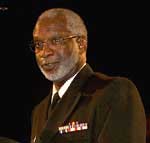Surgeon General: U.S. is "underprepared" for bio attack
By Mary Losure
Minnesota Public Radio
October 16, 2001
U.S. Surgeon General David Satcher says the nation is "underprepared" for bioterriorism but is making rapid steps forward. Satcher spoke by satellite video Tuesday at a conference sponsored by the Minnesota Department of Health.
U.S. Surgeon General David Satcher had been scheduled to appear in person, but concerns over the expanding number of anthrax cases kept him in Washington. He spoke live by satellite before an audience of community groups and health professionals gathered for a conference about an entirely different topic - disease rates that are higher among Minnesota's racial minorities than in the white population. But Satcher also addressed the issue of bioterrorism.
"In these recent weeks we've had some people saying that we are prepared for bioterrorism, other people saying that we are ill-prepared," Satcher said. "I think the truth is that we are much better prepared than we were, say, three years ago, but we still need to continue to improve. We are under-prepared. We're not unprepared, we're under-prepared."
Satcher said in the last three years the nation has devoloped a health alert network of more than 80 laboratories throughout the country. Those laboratories can make diagnoses in cases that formerly had to be referred to the Centers for Disease Control in Atlanta. Satcher said local laboratories were the reason anthrax cases in Florida and New York City were diagnosed so rapidly.
Satcher also cited a national sytem now in place in 97 metropolitan areas, including Minnesota, that trains firefighters and volunteers to make rapid medical responses to disaster. And he said the federal government now has a major training program in Alabama for primary care physicians to learn how to deal with bioterrorism.
"So I think we are making some major progress," said Satcher. "Secretary (of Health and Human Services Tommy) Thompson has just requested a $1.5 billion increase in funding for bioterrorism, that would be five times what is was this current year. What are we going to do with that money? We're going to increase the stockpiles that are sponsored by the CDC. More antibiotics like Cipro, more vaccines against smallpox. We're also going to be able to expand the health alert network throughout the country."
Satcher said the state of Minnesota has been a leader in preparing for bioterrorism. He praised the leadership of former state epidemiologist Dr. Michael Osterholm. Osterholm is a prominent expert on the threat of bioterrorism, and has repeatedly warned the country is not prepared for the threat of bioterrorism.
Minnesota Health Commissioner Janet Malcolm says the state has a strong foundation to fight bioterrorism. She says Minnesota has invested in upgrading its laboratories and epidemiology programs. It also has programs in place to train doctors and hospitals.
"What we don't have enough of is time - to train and practice and prepare with the entire medical community - with physicians and hospitals who have never seen the kind of diseases that we're now urging them to look out for," Malcom says. She adds getting doctors to attend the training will be no problem.
"We used to have a hard time getting invitations to hospitals and physician groups to put on trainings about this. We used to throw a party and nobody would come, and now we can't get out there fast enough," Malcom says. "We've got hospitals every day wanting people to come out and do grand rounds and do lectures. So we're trying to get organized around the most efficient ways to get this training out there."
Malcolm says she doesn't expect the Department of Health will need ask the state Legislature for major funding for programs dealing with bioterrorism. She says the state needs better stockpiles of vaccines and antibiotics, but the federal government needs to organize and fund that nationwide.
Malcolm says the health department may ask the Legislature for some legal or policy changes to fight bioterrorism. For example, the health department may ask for broader powers in cases of an infectious disease outbreak. Currently, the department has the power to quarantine only one person at a time, and it must go to court to do so.
By Mary Losure
Minnesota Public Radio
October 16, 2001
|
|
RealAudio |
| |
|
|
|
||
"In these recent weeks we've had some people saying that we are prepared for bioterrorism, other people saying that we are ill-prepared," Satcher said. "I think the truth is that we are much better prepared than we were, say, three years ago, but we still need to continue to improve. We are under-prepared. We're not unprepared, we're under-prepared."
Satcher said in the last three years the nation has devoloped a health alert network of more than 80 laboratories throughout the country. Those laboratories can make diagnoses in cases that formerly had to be referred to the Centers for Disease Control in Atlanta. Satcher said local laboratories were the reason anthrax cases in Florida and New York City were diagnosed so rapidly.
Satcher also cited a national sytem now in place in 97 metropolitan areas, including Minnesota, that trains firefighters and volunteers to make rapid medical responses to disaster. And he said the federal government now has a major training program in Alabama for primary care physicians to learn how to deal with bioterrorism.
"So I think we are making some major progress," said Satcher. "Secretary (of Health and Human Services Tommy) Thompson has just requested a $1.5 billion increase in funding for bioterrorism, that would be five times what is was this current year. What are we going to do with that money? We're going to increase the stockpiles that are sponsored by the CDC. More antibiotics like Cipro, more vaccines against smallpox. We're also going to be able to expand the health alert network throughout the country."
| |
|
|
|
||
Minnesota Health Commissioner Janet Malcolm says the state has a strong foundation to fight bioterrorism. She says Minnesota has invested in upgrading its laboratories and epidemiology programs. It also has programs in place to train doctors and hospitals.
"What we don't have enough of is time - to train and practice and prepare with the entire medical community - with physicians and hospitals who have never seen the kind of diseases that we're now urging them to look out for," Malcom says. She adds getting doctors to attend the training will be no problem.
"We used to have a hard time getting invitations to hospitals and physician groups to put on trainings about this. We used to throw a party and nobody would come, and now we can't get out there fast enough," Malcom says. "We've got hospitals every day wanting people to come out and do grand rounds and do lectures. So we're trying to get organized around the most efficient ways to get this training out there."
Malcolm says she doesn't expect the Department of Health will need ask the state Legislature for major funding for programs dealing with bioterrorism. She says the state needs better stockpiles of vaccines and antibiotics, but the federal government needs to organize and fund that nationwide.
Malcolm says the health department may ask the Legislature for some legal or policy changes to fight bioterrorism. For example, the health department may ask for broader powers in cases of an infectious disease outbreak. Currently, the department has the power to quarantine only one person at a time, and it must go to court to do so.


